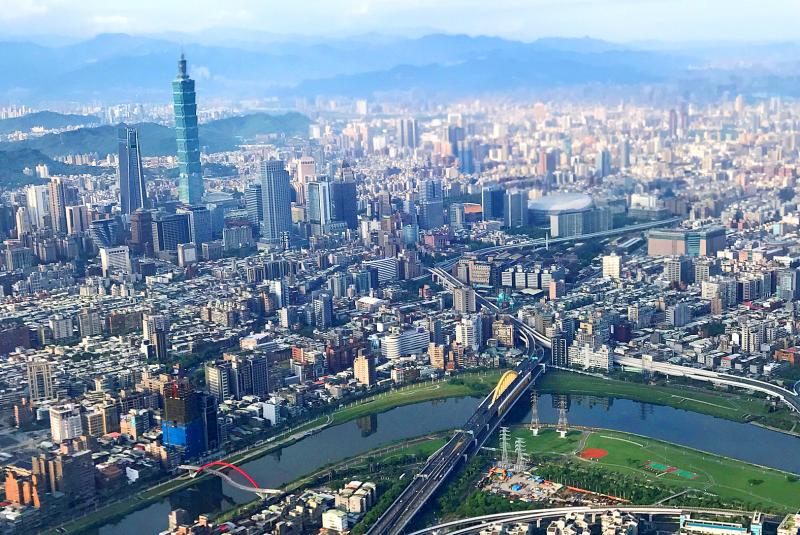More Hong Kongers purchased real estate in Taiwan last year than other foreigners, Ministry of the Interior statistics showed.
The ministry attributed the spike to a proposed extradition law that the Hong Kong government submitted last year, which would have allowed suspects to be sent to China and other nations, which sparked mass protests that are continuing.
The rate of purchases last year by Hong Kong natural and juridical persons stood at 40 and 60 percent respectively, with building area purchased by both standing at 47.41 percent and 52.59 percent respectively, ministry data showed.

Photo: Tyrone Siu, Reuters
Department of Land Administration statistics showed that Hong Kongers purchased 11,200 ping (37,025m2) in total land area, a new high for Hong Kongers’ real estate purchases.
The British Virgin Islands were second with 3,102 ping, with Belize in third with 2,210 ping, Malaysia with 1,358 ping and US nationals or companies in fifth place with 1,185 ping, the statistics showed.
Hong Kongers’ land area purchases exceed those of other countries by 1.43 times, the statistics showed.
In terms of building area, Hong Kongers purchased 48,000 ping, the British Cayman Islands nearly 20,000 ping, the Virgin Islands about 9,600 ping, the US nearly 8,000 ping and Malaysia more than 5,300 ping, the data showed.
The department said that purchases from the Virgin and Cayman islands were made through juridical persons.
Realtors in the know said that many Taiwanese companies have established subsidiary firms in the Virgin and Cayman islands, so the actual purchasers could be Taiwanese companies using a different name.
The difference between those purchases and those made by natural and juridical persons from Hong Kong is that the former are making investments while the latter are considering moving to Taiwan, they said.
Sinyi Realty corporate realty research project manager Tseng Ching-te (曾敬德) said statistics show that the spike in Hong Konger purchases is due to similar living habits and lack of a communications barrier.
The ongoing difficulties in Hong Kong are another reason, with retirees in the majority of those purchasing realty in Taiwan, he said.
National Immigration Agency data showed that there were about 2,000 applications from Hong Kongers for temporary residence before the 2008 financial crisis, but the numbers grew from about 4,574 in early 2014 to 7,506 after the pro-democracy “Umbrella movement” in Hong Kong later that year — a 64 percent increase.
REPro Knight Frank Taiwan Research and Consultancy head Andy Huang (黃舒衛) said there is a clear trend of Hong Kongers investing in Taiwan for political and social reasons.
Regardless of investment, immigration or realty purchasing, or culturally related issues such as culture, Hong Kongers view Taiwan favorably and in an attractive light, he said.
Should Taiwan become more internationalized and offer more jobs, there could be an even bigger influx of Hong Kong capital, he said.

Taiwan has received more than US$70 million in royalties as of the end of last year from developing the F-16V jet as countries worldwide purchase or upgrade to this popular model, government and military officials said on Saturday. Taiwan funded the development of the F-16V jet and ended up the sole investor as other countries withdrew from the program. Now the F-16V is increasingly popular and countries must pay Taiwan a percentage in royalties when they purchase new F-16V aircraft or upgrade older F-16 models. The next five years are expected to be the peak for these royalties, with Taiwan potentially earning

STAY IN YOUR LANE: As the US and Israel attack Iran, the ministry has warned China not to overstep by including Taiwanese citizens in its evacuation orders The Ministry of Foreign Affairs (MOFA) yesterday rebuked a statement by China’s embassy in Israel that it would evacuate Taiwanese holders of Chinese travel documents from Israel amid the latter’s escalating conflict with Iran. Tensions have risen across the Middle East in the wake of US and Israeli airstrikes on Iran beginning Saturday. China subsequently issued an evacuation notice for its citizens. In a news release, the Chinese embassy in Israel said holders of “Taiwan compatriot permits (台胞證)” issued to Taiwanese nationals by Chinese authorities for travel to China — could register for evacuation to Egypt. In Taipei, the ministry yesterday said Taiwan

Taiwan is awaiting official notification from the US regarding the status of the Agreement on Reciprocal Trade (ART) after the US Supreme Court ruled US President Donald Trump's global tariffs unconstitutional. Speaking to reporters before a legislative hearing today, Premier Cho Jung-tai (卓榮泰) said that Taiwan's negotiation team remains focused on ensuring that the bilateral trade deal remains intact despite the legal challenge to Trump's tariff policy. "The US has pledged to notify its trade partners once the subsequent administrative and legal processes are finalized, and that certainly includes Taiwan," Cho said when asked about opposition parties’ doubts that the ART was

If China chose to invade Taiwan tomorrow, it would only have to sever three undersea fiber-optic cable clusters to cause a data blackout, Jason Hsu (許毓仁), a senior fellow at the Hudson Institute and former Chinese Nationalist Party (KMT) legislator, told a US security panel yesterday. In a Taiwan contingency, cable disruption would be one of the earliest preinvasion actions and the signal that escalation had begun, he said, adding that Taiwan’s current cable repair capabilities are insufficient. The US-China Economic and Security Review Commission (USCC) yesterday held a hearing on US-China Competition Under the Sea, with Hsu speaking on